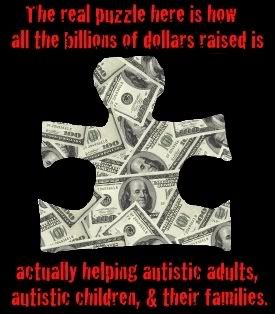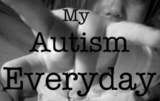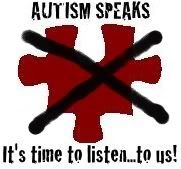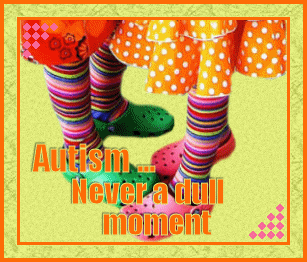 The FDA has granted "Fast Track" designation for a new orally disintegrating tablet of fluoxetine (Prozac), for use in children with autism.
The FDA has granted "Fast Track" designation for a new orally disintegrating tablet of fluoxetine (Prozac), for use in children with autism.
This trial will be the first under Autism Speaks' Clinical Trials Network (CTN):
Neuropharm Group plc (AIM: NPH), a speciality pharmaceutical company focused on neurodevelopmental disorders, is pleased to announce that the US Food and Drug Administration (FDA) has granted Fast Track designation for Neuropharm’s program to develop NPL-2008 in the treatment of Autism Disorder.NPL-2008, a new orally disintegrating tablet of low-dose fluoxetine, is currently in Phase III development for the treatment of the core symptom of repetitive behaviours in patients five years of age or older with Autistic Disorder.
On its website, www.fda.gov, FDA states: “Because fast track products are intended to treat serious or life-threatening conditions and must demonstrate the potential to address unmet medical needs for such conditions, an NDA for a product in a fast track development program ordinarily will be eligible for priority review and FDA may consider for review, portions of a marketing application before the complete NDA is submitted. Fast Track is intended to facilitate development and expedite review of drugs to treat serious and life-threatening conditions so that an approved product can reach the market expeditiously.”
The NPL-2008 program received Orphan Drug Designation from FDA in 1999, giving the product the potential for seven years of market exclusivity on receipt of regulatory approval. In addition the FDA Office of Orphan Drug funded a clinical study in children and adolescents at Mount Sinai School of Medicine in New York followed by a second study in adults.
Neuropharm’s current Phase lll study (SOFIA) underwent Special Protocol Assessment by FDA in 2007. The study is currently ongoing at 17 sites in the US in collaboration with Autism Speaks, the US advocacy organization, and its Clinical Trials Network of expert investigators. The results from this randomised, double-blind trial in more than 120 child and adolescent patients with Autistic Disorder will form part of the NPL-2008 New Drug Application, which is targeted for submission to FDA in Q4 2008.
Robert Mansfield, Neuropharm’s CEO, commented: “We are delighted to announce that FDA has granted Fast Track designation for our program. The point was made earlier this month on World Autism Awareness Day that more children will be diagnosed with autism this year than with diabetes, cancer and AIDS combined. Fast Track designation emphasises the importance we believe should be accorded to this condition.”
SOFIA is the first industry-sponsored trial for Autism Speaks' Clinical Trials Network (CTN), and will include over 120 children and adolescents with autism enrolled across the U.S. at participating CTN sites. The study is evaluating the efficacy of Neuropharm's new melt-in-the-mouth formulation for the treatment of repetitive behaviors in autism. This study will be a crucial part of an application to receive an autism indication for this formulation of fluoxetine.
I have no doubt that for those parents whose children are presently taking Prozac or who are currently considering it, such a trial will be a relief. With the majority of medications, trials are typically done on adults. The effects of the drugs on those under 18 are often unknown (and, especially unknown when it comes to individuals with autism). Bad reactions in the pediatric community only come to light once a serious side-effect has occurred.
Prozac was approved for pediatric use in 2003 and is generally well-tolerated. A trial focused on a pediatric autistic population (for both efficacy and side-effects) will benefit many. A dissolving tablet will be much easier for children to tolerate, as well.








 This Way of Life
This Way of Life









 "Autism is a way of being. It is pervasive; it colors every experience, every sensation, perception, thought, emotion, and encounter, every aspect of existence. It is not possible to separate the autism from the person."
- Jim Sinclair
"Autism is a way of being. It is pervasive; it colors every experience, every sensation, perception, thought, emotion, and encounter, every aspect of existence. It is not possible to separate the autism from the person."
- Jim Sinclair
























15 comments:
Since when did "repetitive behaviours" constitute "serious or life-threatening conditions"?
Gah.
-- abfh (who is likely to egngage in a repetitive behaviour or two after reading a story like that)
I hear ya! My only thought is repetitive self-injury behaviors? I don't know. I certainly wouldn't put a child on medication for stimming etc. But, I have seen prozac be very beneficial for people with depression and other issues. So, I think it's great to have as an option. But, I do agree, for what they are listing it as...not so sure.
Forgot to add...your last comment made me laugh. Perhaps you could use an oxytocin infusion? Yes, I'm being sarcastic.
I dug up this study, again using medication to prevent "repetitive behaviors."
http://www.ncbi.nlm.nih.gov/pubmed/12496956
Prozac already comes in a liquid form so I'm not sure why a tablet would be of any more benefit.
prozac and autism: not a good combination.
firstly, there's already great controversy with the use of prozac, especially with children. reports say that people on prozac are much more likely to commit suicide than people on other anti depressants, as seen here: http://www.usatoday.com/news/health/2004-09-13-prozac_x.htm . there is also a connection between prozac and related ssri's and many mass shooters, most notably the columbine high school shooters. i would also take a look at this video, particularly about halfway through when they talk about prozac: http://video.google.com/videoplay?docid=-3609599239524875493 . and this is just the tip of the iceburg, i suggest you google for more info on this issue.
secondly, i think the autism speaks induced hysteria of autism being "an epidemic" and "a global health crisis" combined with the comparisons to AIDS and Cancer made the FDA infer that autism is a life threatening disease that must be combatted as soon as possible. it's sad that treatments that could actually save some lives are being squashed for eugenic-esque projects.
these two elements combined create a very scary situation for everyone, but more so for the autistics, as they may be forced to take the prozac eventually.
cs: Who knows? I think the drug companies want to 'offer' as many formulations etc. to their 'consumers.' Some people do better with a meltable or chewable tablet vs. a liquid (swallowing issues, sensory issues, etc.). Perhaps that's why?
Anon: Thanks for those links. Yes, there are very real risks for Prozac, as with any medication. But, there are also many people who have been greatly helped thanks to them (me being one of them, as a teenager suffering from severe depression). There is a great benefit for such medications. What is very important is that the patient (adult or child) be monitored closely while on such medications, and that the person also receive counseling and strong support at home.
Prozac, as well as any other medication, should be an option to people. I know quite a few adult autistics who take medication to help them be independent and in good mental health. Likewise, I know even more "NT" adults who take medication to help them with anxiety, depression, etc. If trials take place looking at the autistic population, this is a benefit.
Doctors need to be aware of parents who may be drug-happy, and prefer to have their children be zombies. I think medications should be a last resort, when all other options have been tried. AND, again, that the parents and physicians closely monitor their children while on medication. The bottom line is many people, children included, have been helped with the use of various medications.
I agree with you on Autism Speaks, they are infamous for creating mass hysteria. I HATE the comparison of autism to diabetes, cancer, et al. It is sickening. Their goal, it appears thus far, is to come up with a prenatal test so that "autistic" fetuses can be aborted (just as we've seen with Down Syndrome). This too sickens me.
The ridiculous amount of money Autism Speaks raises needs to start going toward programs that would actually benefit autistic adults, children, and their families. I've seen nearly zero evidence of them doing anything helpful in that area. It is a shame that all the major autism organizations (the ones that get airtime) all only promote the idea that autism is a dreadful thing, something to be 'cured' and gotten rid of.
When will any of these groups realize that autistics are human beings, due all the same civil and human rights as anyone else? I'm so sick of the pity parties, the desperation, the whining. Acceptance is key, getting GOOD programs running (to help with vocational training, living assistance, etc.) is THE utmost need when it comes to autism.
The only way I could see justifying a drug treatment for "repetitive behaviors" is if they're talking about self-injury. Self-injury (even if it's repetitive in nature, such as repeating banging one's head) is in such an entirely different class from stimming (which I've also seen used to refer to self-injury?!). Why can't we get some consistency with the way they use their words?
And re: Autism Speaks - I agree, s.l. - the educational and governmental systems are so hard to navigate through their bureaucracy to get services - and that's just when they're available! Perhaps funding incentives would make schools more receptive to providing adequate services to autistics rather than just trying to get away with helping as little as possible. And while they're out there spreading "awareness" - we could do with less of the pity talk and more action; make sure that schools and employers are educated about autism so that they don't base their decisions about students and employees off of stereotypes - the main reason I believe I haven't gotten the kind of support I need in school.
I agree with you 100% geosaru! Repetitive, dangerous self-injury is one thing--but stimming or repetitive speech, etc. is totally different AND not something to be medicated. A lot of parents see many "autistic traits" as annoyances, this goes along with the whole Autism Speaks' elitist way of thinking.
Most schools and government agencies are all a joke. It is very sad. Wherever a child is on the spectrum, the schools simply are not getting it right. When I think of my child's future--it's not that I'm upset because of her autism or her health issues. No, my fears and concerns lie with how the schools will help her, what will be available to her when she becomes an adult, and how society will relate to her.
For the life of me, I cannot understand why all these so-called "autism" charities don't get it. Although, I guess if your spokesperson doesn't even acknowledge that adult autistics exist or that not a single autistic person is on your board, we are all s.o.l. I can only hope that all of our voices, combined with all of our actions, will lead to REAL change.
Charlie took Prozac for maybe 2 weeks and it did not help him---made some things worse---increased the intensity of the behaviors (and that was why we had tried it for him). It's a trial and error process for individual families and individual kids.
s.l.: i know that ssri's do help some people under proper supervision, but i was referring more to the idea that some doctors/parents will now just put all of their autistic patients on prozac (or another ssri) as their first course of action and go on their merry way, like what we are seeing now with many add/adhd children. i don't want to see people that don't benefit or get worse from the prozac (in part due to the controversy) on the drug when there are other options for education and treatment out there. prozac should be an option, but i don't want it to be a mandatory/primary treatment for autism.
Kristina: Thanks for sharing Charlie's experience. You are right on: it is trial & error for every person.
Anon: We are in total agreement. It is scary how many parents are quick to medicate their children. For every little thing--the simple 'fix' is drugs. I am VERY much for medication being a last resort. We've been very weary of any medication, for either of our girls. From antibiotics to other drugs. Even as a teen, I worked hard with counseling before agreeing to take medication. So, we are together in that view, for sure. And, I pray that no medications are ever mandatory for autistics.
You have a very good site!
Buona Sera! Rodney Garcia . payday loans
Goodness, there is a great deal of effective info above!
It helped my grandson from banging his head, scratching, aggression and he is a totally different kid. Thank god for Prozac. He has a chance to learn and possibly speak soon.
Post a Comment